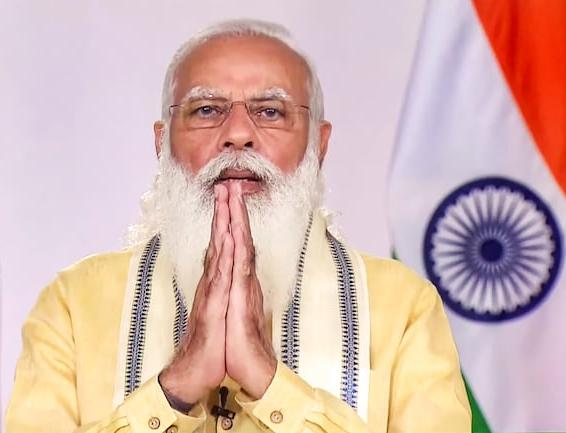

By Sunil Garodia
First publised on 2021-06-08 01:25:52
In his address to the nation on Monday, Prime Minister Modi announced that the his government was accepting the request made by the states and taking over the entire process of procurement and supply of vaccines, as it was being done before the vaccination policy was 'liberalized' in May. He said that all adults would receive jabs free of cost once this was put in place. However, he allowed private hospitals to get 25% of the vaccines produced to jab those who wished to pay for being vaccinated, capping the cost at price of the vaccine plus Rs 150 service charge. He also extended the benefit of free food grains to the poor under the PM Garib Kalyan Anna Yojana till Diwali 2021.
The Prime Minister took pains to explain why the vaccination policy was tweaked. He said that when the vaccine procurement and supply were centralized, there were demands from many states for decentralization. The government had then accepted their demand by giving them direct access to 25% of the vaccines manufactured. He said that the states were experiencing difficulty in pricing and getting the vaccines directly from the manufacturers and there were demand for the Centre to buy and supply to the states. He said that the government has accepted their demand and the vaccine drive would now be centralized once more with free supplies to the states and free jabs for all.
As expected, while some opposition ( Kerala chief minister Pinarayi Vijayan, Punjab chief minister Amarinder Singh and Odisha chief minister Naveen Patnaik being among them) leaders thanked the Prime Minister for accepting their demand, the Congress, the TMC and the AAP chose to say that the government had acted only after its 'liberalized' policy was called "irrational and arbitrary" by the Supreme Court which also demanded that the government come up with a road map for how it proposed to vaccinate all by December 2021. While there can be no denying the fact that the Supreme Court observations must have prodded the government into tweaking the policy once more, it is also a fact that the original tweak was made after a chorus from the states who wanted more say in the vaccination drive. Mamata Banerjee's letter to the PM on February 24, making this specific demand, is already doing the rounds on social media after Congress leader P Chidambaram said the PM was blaming the opposition for his mistakes and demanded proof ("Let us know which CM, which state government, on what date demanded that he should be allowed to procure vaccines") of such demands.
The decision to extend free food grains supply to the poor by 5 months till November is also good. Given the fact that the second wave is expected to take a heavy toll on the economy (and this will become known only in the next couple of months) with business closures (the Hyatt Regency hotel in Mumbai has already closed down till further notice as there is no money to pay salaries), job losses and pay cuts, it is necessary to support the poor in whatever way we can. As the Prime Minister said, the free food grain supply would ensure that they do not suffer from hunger.
The Prime Minister also advised people not to pay heed to the misinformation being spread about the vaccines and get jabbed once their turn comes. He once again emphasized that despite the vaccines, the coronavirus has not disappeared and that the people should strictly follow the Covid protocols of wearing masks, washing hands regularly and maintaining physical distance. It is universally accepted that the only way to win the battle against the virus is to rapidly vaccinate the people and strictly follow Covid protocols till more than 60-70 percent of the population is fully vaccinated.











